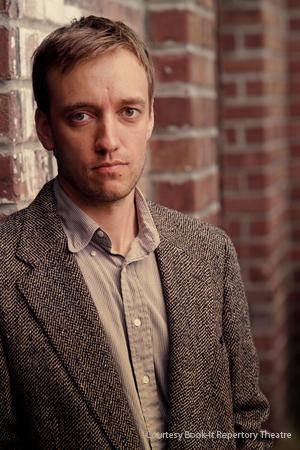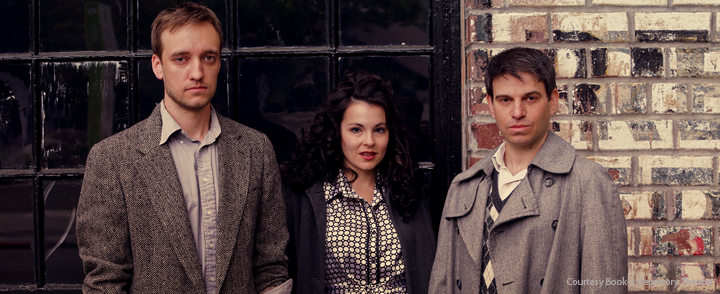By Deborah Gardner, Special to The Jewish Sound
Michael Chabon’s popular 2001 Pulitzer Prize-winning novel, “The Amazing Adventures of Kavalier & Clay,” is packed with themes of metamorphosis and reinvention. It’s 1939, the golden age of comics, when Brooklyn-stifled Sammy Clay meets his cousin, Joe Kavalier, a fresh escapee of Nazi oppression in Prague. The Jewish cousins share a talent for creating comics and a penchant for big dreams, whether of Houdini-esque escape, wealth, heroism, or bringing Joe’s family to America.

Now the novel is experiencing a transformation of its own for the stage. Book-It Repertory Theatre’s new adaptation of “The Amazing Adventures of Kavalier & Clay” is an evening-long theatrical event –– complete with dinner break.
“Sammy and Joe “’break free of the nine panels’ in traditional comic book artistry,” explains director Myra Platt. “For our purposes, we decided to break free of a traditional theatrical form.”
Still, Platt says, “our aim is always to celebrate and honor the original intent of the author, no matter what. Artistic interpretation is always involved…. but our goal is to bring to life as much of the novel as possible in the voice of Michael Chabon.”
It’s an ambitious undertaking. The small cast takes on roughly 92 characters in a time period that spans Sammy’s life from age 17 to his early 30s. David Goldstein, the seasoned Book-It actor who plays Sammy, acknowledges the challenge of portraying so much of a character’s life span. Goldstein grew up a comics-loving kid with a father from Brooklyn. Visiting New York, he connected with stories of 1930s and 1940s Brooklyn Jewish life. In part because of his Jewish heritage, the story’s themes resonate.
“A lot of this story is about these guys trying to find their identity, and to figure out what is that Jewish identity in the early 1940s,” Goldstein says. “I definitely can identify with that, having grown up in Montana and Alaska where there’s not a lot of Jewish identity.”
Goldstein believes that Seattle’s Jewish community would have a lot of appreciation for the story, “because it’s really about Jewish identity, not only in that time but also beyond.”
Not that the characters’ experiences are identical. Goldstein describes Sammy as “your traditional Brighton Beach Memoirs sort of Jewish kid.” Joe has just arrived from 1940s Europe. Rosa ––an artist in her own right whom Platt describes as “a critical fulcrum on which the partnership is balanced,” is, Goldstein says, “a Jewish bohemian who grew up in Greenwich Village.”
Their setting and histories shape complex, personal journeys dealing with sexuality, perseverance, betrayal, and reactions to World War II. But while Sammy and Joe are different from each other, Goldstein says, “they’re both not the strapping blond superheroes that they’re drawing.” The story makes “use of comic books as escapism, or transformation of your character to something else.”
Portraying the mounting awareness about what was happening in Europe has been a moving experience for cast and crew.
“The play,” Platt says, “represents the multitudes of our population that went through that. To have someone coming over who is desperate to get the rest of their family free and not able to do anything, and the frustration that there was nobody to help. So Sammy, as the cousin to Joe, seeing him hurting, does the only thing he knows how to do, with the comic book industry. This is fictitious but is based on true stories…. A few Jewish kids who really got that bandwagon rolling is a part of our American history that we don’t normally tell.”
To enhance the historical accuracy, dramaturg Lenore Bensinger has researched relevant historical and cultural information from that shared time.

A theatrical version of Kavalier & Clay offers another type of shared experience. In contrast to the solitude of reading a novel, an audience experiences theatre together. While there has been talk for years of a film adaptation of the novel, it has never panned out, so this production, Platt notes, may be the only adaptation audiences will see.
“If you like Michael Chabon and his work, you shouldn’t miss it; period,” Platt says. But, she adds, the play also engages audience members who haven’t read the novel.
